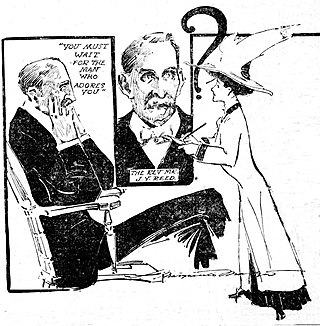
The muckrakers were reform-minded journalists, writers, and photographers in the Progressive Era in the United States (1890s–1920s) who claimed to expose corruption and wrongdoing in established institutions, often through sensationalist publications. The modern term generally references investigative journalism or watchdog journalism; investigative journalists in the US are occasionally called "muckrakers" informally.
Computer-assisted reporting describes the use of computers to gather and analyze the data necessary to write news stories.

The Center for Public Integrity (CPI) is an American nonprofit investigative journalism organization whose stated mission is "to counter the corrosive effects of inequality by holding powerful interests accountable and equipping the public with knowledge to drive change." It won the 2014 Pulitzer Prize for Investigative Reporting, and in 2023, the Edward R. Murrow Award for General Excellence.

Brian Laurence Deer is a British investigative journalist, best known for inquiries into the drug industry, medicine and social issues for The Sunday Times. Deer's investigative nonfiction book The Doctor Who Fooled the World, an exposé on disgraced former doctor Andrew Wakefield and the 1998 Lancet MMR autism fraud, was published in September 2020 by Johns Hopkins University Press.

Charles Lewis is an investigative journalist based in Washington D.C. He founded The Center for Public Integrity and several other nonprofit organizations and is currently the executive editor of the Investigative Reporting Workshop at the American University School of Communication in D.C.
John M. Crewdson is an American journalist. He won a Pulitzer Prize for The New York Times, where he worked for 12 years. He subsequently spent 26 years in a variety of positions at the Chicago Tribune.
Bill Dedman is a Pulitzer Prize-winning American investigative reporter and co-author of the biography of reclusive heiress Huguette Clark, Empty Mansions: The Mysterious Life of Huguette Clark and the Spending of a Great American Fortune.

Journalism in the United States began humbly and became a political force in the campaign for American independence. Following independence, the first amendment to the U.S. Constitution guaranteed freedom of the press and freedom of speech. The American press grew rapidly following the American Revolution. The press became a key support element to the country's political parties, but also for organized religious institutions.
Leonard "Len" Downie Jr. is an American journalist who was executive editor of The Washington Post from 1991 to 2008. He worked in the Post newsroom for 44 years. His roles at the newspaper included executive editor, managing editor, national editor, London correspondent, assistant managing editor for metropolitan news, deputy metropolitan editor, and investigative and local reporter. Downie became executive editor upon the retirement of Ben Bradlee. During Downie's tenure as executive editor, the Washington Post won 25 Pulitzer Prizes, more than any other newspaper had won during the term of a single executive editor. Downie currently serves as vice president at large at the Washington Post, as Weil Family Professor of Journalism at the Walter Cronkite School of Journalism and Mass Communication at Arizona State University, and as a member of several advisory boards associated with journalism and public affairs.
Claims of a link between the MMR vaccine and autism have been extensively investigated and found to be false. The link was first suggested in the early 1990s and came to public notice largely as a result of the 1998 Lancet MMR autism fraud, characterised as "perhaps the most damaging medical hoax of the last 100 years". The fraudulent research paper, authored by discredited former doctor Andrew Wakefield and published in The Lancet, falsely claimed the vaccine was linked to colitis and autism spectrum disorders. The paper was retracted in 2010 but is still cited by anti-vaccine activists.

Joachim Dyfvermark is a Swedish investigative reporter/producer working for the current affairs program Uppdrag granskning broadcast on Sveriges Television.
Hopewell Rugoho-Chin'ono is a Zimbabwean journalist. He has won numerous awards in journalism and has worked in both print and broadcasting journalism. He was a fellow at Harvard.

Scott Higham is an American investigative journalist and author who documented the corporate and political forces that fueled the opioid epidemic, in addition to conducting other major investigations. He is a five-time Pulitzer Prize finalist and won the Pulitzer twice with his colleagues at The Washington Post. He is a member of The Post’s investigative unit and the co-author of two books.
Susanne Rust is an American investigative journalist.
The International Consortium of Investigative Journalists, Inc. (ICIJ), is an independent global network of 280 investigative journalists and over 140 media organizations spanning more than 100 countries. It is based in Washington, D.C., with personnel in Australia, France, Spain, Hungary, Serbia, Belgium and Ireland.
Gary Cohn is an American Pulitzer Prize-winning investigative reporter and adjunct professor at the University of Southern California Annenberg School for Communication and Journalism.

Offshore Leaks is a report disclosing details of 130,000 offshore accounts that came out in April 2013. Some observers have called it the biggest hit against international tax fraud of all times, although it has been pointed out that normal businesses may use the offshore legislation to ease formalities in international trade.
Deborah Nelson is a Pulitzer prize-winning freelance journalist at Reuters and the Associate Professor of Investigative Reporting at the Philip Merrill College of Journalism at the University of Maryland.
A stunt girl was a woman investigative journalist in the late 19th and early 20th centuries in the United States. The term was often used derogatorily.








